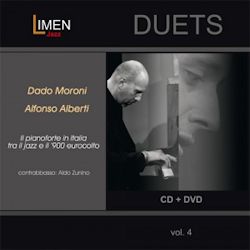1. Walkin’ the Town
2. Brother Alfred
3. PB’s Flat
4. Tender Storm
5. Cedar’s Sphere
6. Cangianti
Quaderno Musicale di Annalibera
7. Simbolo
8. Accenti
9. Contrapunctus primus
10. Linee
11. Contrapunctus secundus (canon contrario motu)
12. Fregi
13. Andantino amoroso e contrapunctus tertius (canon cancrizans)
14. Ritmi
15. Calore
16. Ombre
17. Quartina
Dado Moroni – Piano (tracks 1-5)
Alfonso Alberti – Piano (tracks 6-17)
Aldo Zunino – Bass (tracks 1, 3-5)
This album not only has a misleading title but it is also a strange mixture of musical styles. There are only a few duets here – between Italian pianist
Dado Moroni and bassist Aldo Zunino – and jazz fans may be surprised that the album’s offerings are not entirely jazz. In fact the jazz segment and the
duets reside in the first five tracks: thereafter another Italian, Alfonso Alberti, performs a programme of avant-garde 20th-century works which
contain no jazz whatsoever.
Dado Moroni is self-taught, so his style is therefore unorthodox. He stays mainly in the middle area of the piano, with occasional forays to left or right.
He uses both hands to play rich chords, often with unusual voicings and hints of the blues. All five tracks are compositions by Moroni himself, and in Walkin’ the Town his playing gains strength as the track proceeds. He is accompanied by bassist Aldo Zunino, whose solo in this first track Moroni
accompanies by strumming the piano strings.
Zunino drops out for Brother Alfred, a lyrical piece which may be a portrait of the Alfred in the title, or even an elegy for him. Dado’s
improvisation includes some fiery fingerwork. Here and elsewhere, he lets the piano ring at the end of a tune, savouring the overtones. There’s a humming
sound during PB’s Flat, which seems to emanate from Moroni, accompanying the music in the style of Oscar Peterson. Cedar’s Sphere (a
tribute to Cedar Walton and Thelonious Monk?) is an almost childlike theme but Dado makes it swing vigorously.
Track 6 introduces an entirely different kettle of fish. Alfonso Alberti plays some avant-garde pieces which contain no melody and little harmony.
According to the sleeve, track 6 was composed by Niccolo Castiglioni and track 7 was written by Luigi Dallapiccola, both of whom were interested in
twelve-tone music. Alberti appears to stab the piano, with fragmentary clusters and single notes, as well as pressing down on the keyboard with the side of
his arm. There were occasional echoes of Debussy in the quieter moments but these passed quickly. The indeterminate, discordant style reminded me of jazz
improv where nobody knows what is happening – but that is the nearest this segment came to jazz. I cannot understand why such incongruous playing was
issued alongside the glorious improvised jazz of Dado Moroni.
This album comprises a CD plus a DVD showing Dado and Alfonso performing the same programme as on the CD.
Tony Augarde
www.augardebooks.co.uk
